Home > Articles > The Archives > The Weary Hearts
The Weary Hearts
Reprinted from Bluegrass Unlimited Magazine
August, 1988, Volume 23, Number 2
If someone were to say “weary hearts” to you, you’d probably think that they were referring to a new romance novel or day-time soap opera. However, anyone familiar with bluegrass music knows of the song, “The Weary Heart You Stole Away,” recorded by the Stanley Brothers (with Jim Williams, Art Stamper and George Shuffler) in August, 1953. Recorded in their first session for Mercury Records, the song is one from the Stanley Brothers that epitomizes the best in traditional bluegrass music. Knowing this makes it much easier to understand how a fairly new, young band from the southwest called the Weary Hearts approaches bluegrass music.
The four members of the Weary Hearts complement one another, in conversation as well as music. As an example, I asked the band to define the type of bluegrass music played by their group. One member says, “Traditional!” A second member adds, “. . . with a 1980s freshness.” A third member of the group builds on the answer with, “We play mountain-style bluegrass with a more contemporary rhythm.” And, the fourth member gets the last word. “But, we still keep our traditional music simple by conveying emotion, rather than trying to amaze the audience with hot licks.”
The Weary Hearts are Mike Bub, Ron Block, Butch Baldassari and Chris Jones. The band’s average age is only twenty-eight, and because of this, the group presents its music with youthful spirit, energy and enthusiasm. Yet, at the same time, the band members have studied bluegrass music diligently and present it with the same professionalism and precision found typically in the most seasoned, enduring bands.
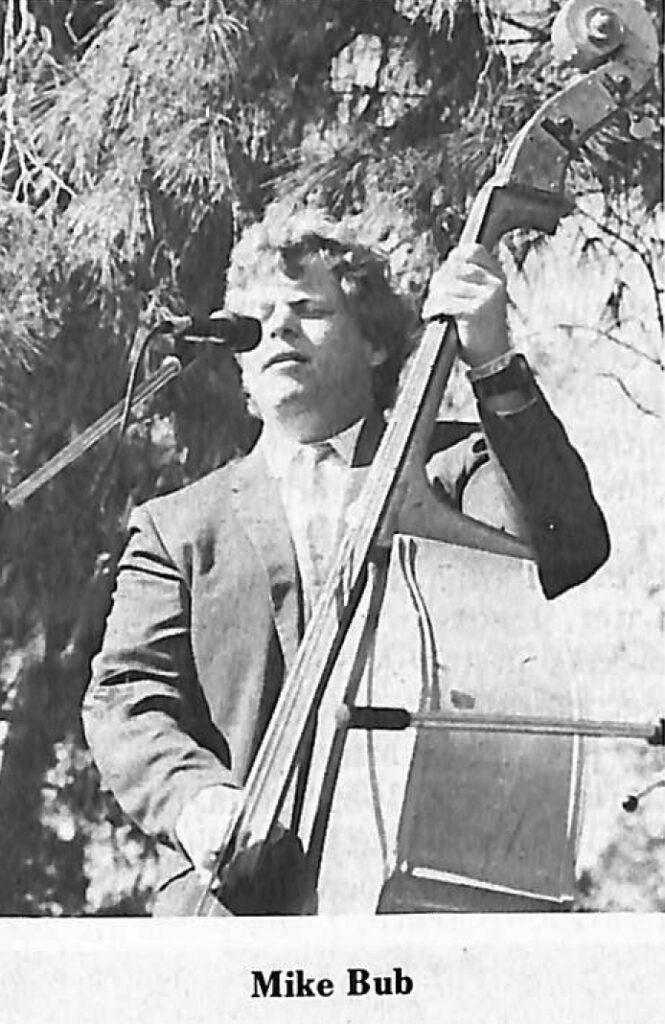
Mike Bub, bass player with the group, was born in Los Angeles in 1964, but raised in Tucson and Scottsdale, Arizona. According to Mike, “I was exposed to bluegrass from records in the family. I was influenced by the major groups such as the Stanley Brothers, Osborne Brothers, Flatt and Scruggs and Bill Monroe. I also was influenced heavily by many west coast and southwest pickers including Nick Haney, Stuart Duncan, John Hickman, plus the Vern Williams Band, Lost Highway and Cheyenne.” In the fall of 1983, Mike landed his first bluegrass job playing with Lost Highway. In the spring of 1984, Mike joined the Brew County Ramblers of Milwaukee, Wisconsin, as their banjo player. In the summer of 1984, he moved on to a banjo-playing job with Bob Paisley and the Southern Grass, based in Lancaster, Pennsylvania—in September, 1984, the group toured Japan. In July, 1985, Mike won the prestigious Alan Munde U.S. Banjo Championship. In November, 1985, Mike formed the Weary Hearts. The musician currently plans to continue honing his bass, banjo and guitar skills as well as to see the Weary Hearts “make records, work festivals and travel all over the world.”
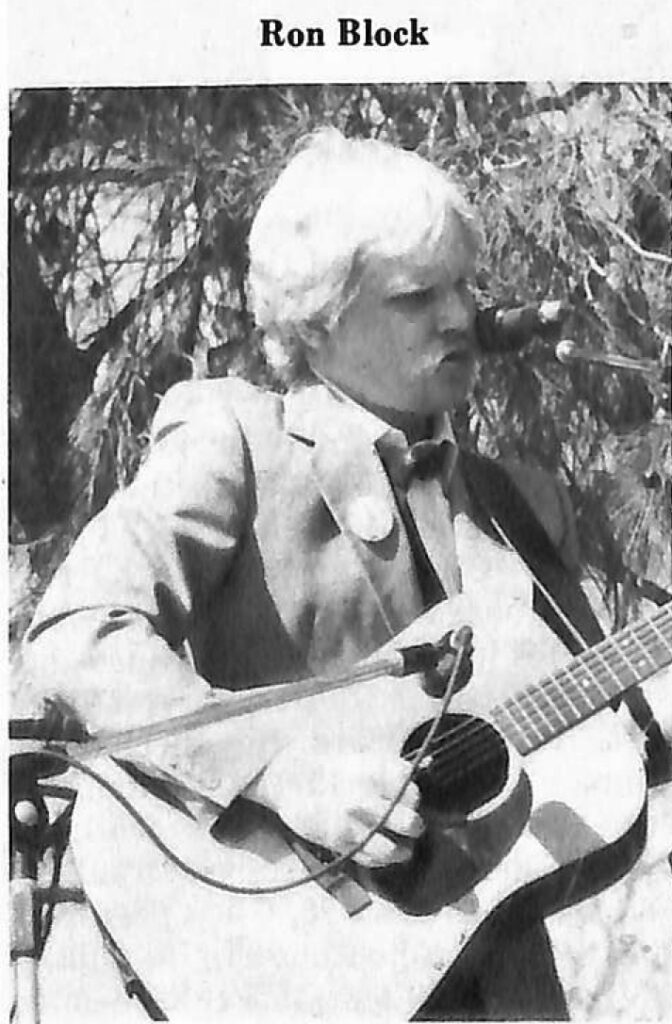
Ron Block was born in 1964 and raised near Grass Valley, California (home to some of California’s biggest bluegrass festivals). “I remember seeing Lester Flatt on television when I was thirteen. The music really blew my mind. Two years later, in 1979, I got a banjo. Today, I play a Gold Star J.D. Crowe model banjo and a 1969 Martin D-18 guitar, as well as sing tenor with the Weary Hearts. John Hickman, Earl Scruggs and J.D. Crowe, influenced my banjo playing. I took lessons from John Hickman, and he taught me about tone, timing and taste. My major guitar influences are George Shuffler, Larry Sparks, Clarence White, and Roy Nichols.” Ron has published a book entitled, “The Traditional Guitar Workbook,” featuring the styles of Shuffler, Sparks, White, Bill Napier, Don Reno, and Junior Blankenship. Concerning his singing, Ron adds, “the Stanley Brothers were my biggest influence. They had the elusive ability that only true artists have—to convey emotion and soul. Bill Monroe and Flatt and Scruggs were other major influences.”
Ron is a talented instrumentalist who has contest wins in many locations including Calico, California, Kerrville, Texas, and Wickenburg, Arizona. He was also first runner-up in the 1985 National Flatpicking Contest in Winfield, Kansas. With Mike Bub, Ron went to South Plains State college in Levelland, Texas to study bluegrass music.
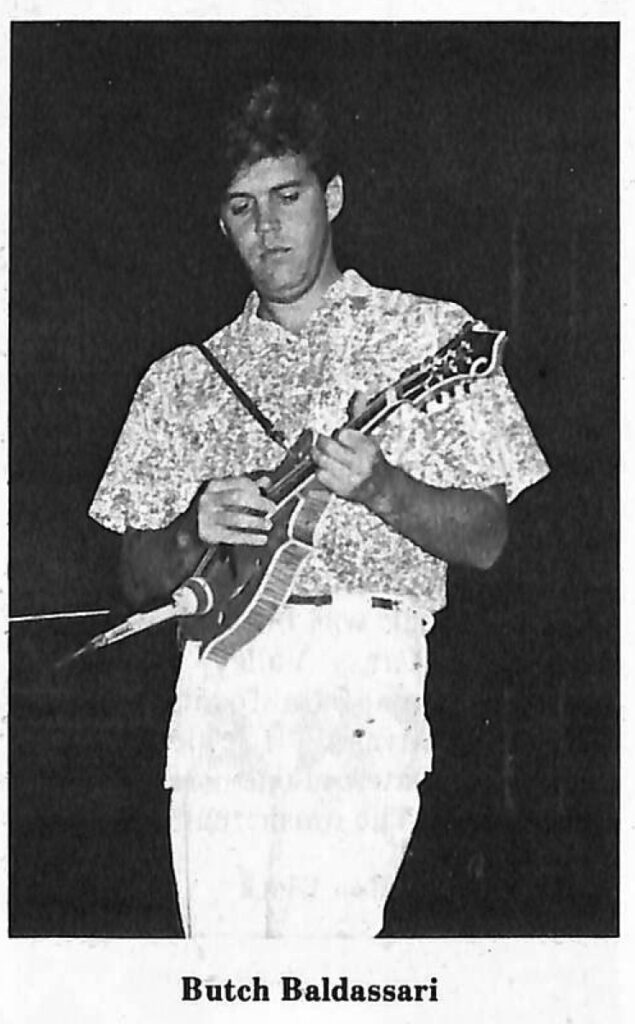
Butch Baldassari was born in Scranton, Pennsylvania, in 1952. His desire was to be either a drummer or sax player, but his father instead encouraged him to study guitar. He took up the mandolin in 1973 after attending the 1972 Philadelphia Folk Festival. In 1977, Butch moved to Las Vegas, Nevada, and played with popular Nevada bluegrass groups Dry and Dusty, Desert Wind, and Sagegrass. Today, when Butch is heard playing his 1925 unsigned Lloyd Loar Gibson or 1984 Mike Kemnitzer Nugget mandolin, it is clear that he has developed a distinctive playing style and mastery of many types of music.
In late-1987, Butch released his debut album (Cactus CT-103) called “What’s Doin’?” which features everything from bluegrass to new acoustic music, Irish fiddle tunes to jazz (see BU, April, 1988). With the help of Las Vegas jazz violinist Elek Bacsik, bluegrass fiddler Stuart Duncan, jazz bassist Rudy Aikels, and jazz banjoist Pat Cloud, the music is a treat for the ears. Butch hopes that the album will be picked up by a major label and distributed nationally. Another of Butch’s current projects includes a mandolin instruction book, cassette and video tape. Despite his comfort with new acoustic music, Butch also finds traditional bluegrass challenging. “Playing traditional music correctly is very hard. You must play it with soul so that the audience can feel it. Playing traditional mandolin means focusing more on what you don’t play, than on what you do play.”
From late-1985 to early-1988, the Weary Hearts’ guitar and lead vocals were handled by Eric Uglum, a native Kentuckian raised in southern California. He took up guitar in high school, playing the typical acoustic pop songs popular at the time. “I worked up some contest style fiddle tunes and played those for a number of years.” Eric went on to become the 1982 West Coast Champion flatpicker and has placed in the national competition in Winfield, Kansas. During his tenure with the Weary Hearts, Eric’s singing always gave the band a distinctive sound. Says Eric, “A number of people that play and sing with soul have influenced me. Basically, I enjoy any music that moves me. And I try to sing with the same soulful emotion that the Stanley Brothers had. When I was with the Weary Hearts, we were always more concerned with moving the audience than with impressing them.” In early 1988, Eric left the band to pursue other interests.
In May, 1988, Chris Jones joined the group as their guitarist and lead vocalist. Chris, born in Brooklyn, New York, in 1959, was raised in New York and New Mexico. Says Chris, “My father owned a number of country and bluegrass records, and I began listening to Bill Monroe and the Osborne Brothers when I was around 12 or 13. Later, I got to know other bluegrass pickers in the Albuquerque area and learned to flatpick, but it was the singing that really attracted me.” Today, Chris plays a 1969 Gallagher guitar, and it’s clear from his singing that he’s been heavily influenced by the Stanley Brothers. Some of his other favorites include Larry Sparks, Del McCoury, George Jones, and Ronnie Milsap.
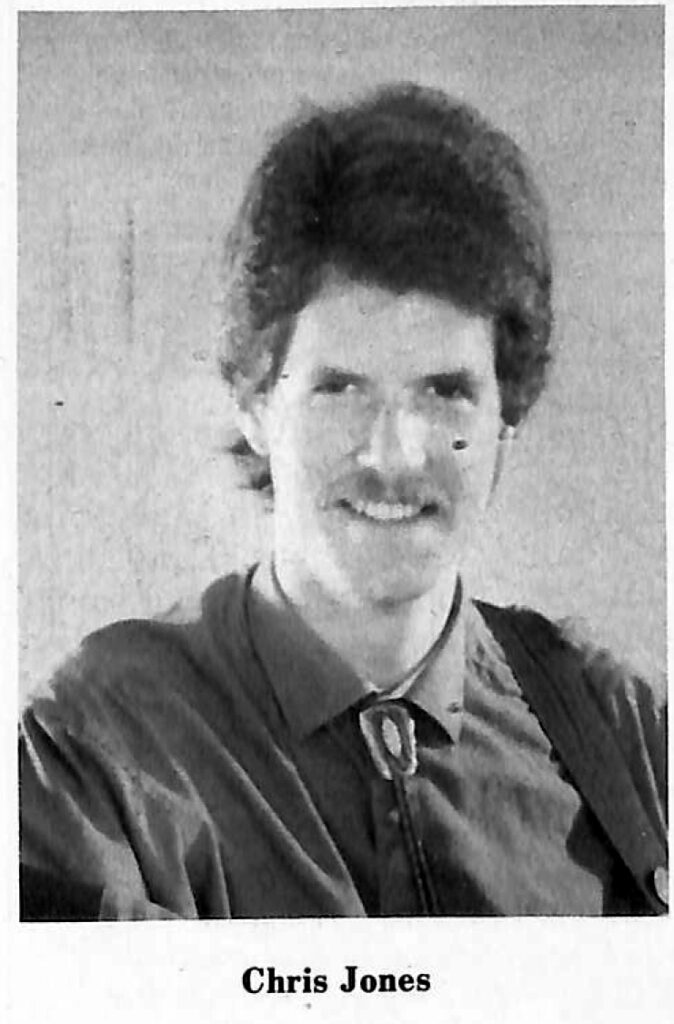
Chris’ first bluegrass band was called Horse Country, a group he picked with from 1979-80 in the Hudson Valley area of New York. From 1981-84, Chris played with the Chicago-based Special Consensus, known for its strong urban stylings and influences (see BU, February, 1979). Chris can be heard on their 1983 album, “Blue Northerns” (Acoustic Revival 33009), which also featured one of Chris’ original songs, “Endless Highway.” In 1985-86, Chris performed with Whetstone Run, a tight, polished, band from central Pennsylvania.
More recently, the musician played with Boston City Limits (from Massachusetts). The band, which featured duets with former “Fiction Brother” Howie Tarnower, toured Europe in the summer of 1987. Chris has also authored “Designing Guitar Solos for Bluegrass Songs,” released by Workshop Records and well- received by the bluegrass community. Chris says his future plans are to “play and sing the best music I can, and to write more songs. Oh yes, and to make a living doing it.”
In addition to the impressive credentials and contest wins of the individual band members in the Weary Hearts, the band as a whole has also worked for credibility in the bluegrass field. In their first performance on stage at the Four Corners Bluegrass Contest in Wickenburg, Arizona, the group walked off with first place in the bluegrass band category.
They’ve also gone on to win the 1985 Southwestern Bluegrass Band Championship in Kerrville, Texas, and the 1986 Payson, Arizona, Old-Time Music Festival band contest. In 1986, they placed seventh at the SPBGMA contest in Nashville, and in 1987 came in third at the SPBGMA contest. In both cases, they were assisted by Stuart Duncan of the Nashville Bluegrass Band on the fiddle.
The Weary Hearts’ first album was released in 1986 on cassette, and it showcased the band’s instrumental and singing abilities, timing and rhythm (see review in BU, March, 1987). Further, this album showed that the band picks its material carefully, aiming for a variety of lesser-known traditional bluegrass tunes, such as Carter Stanley’s “Who Will Sing For Me,” and “Wings Of Angels,” and E. MacGregor’s “Swingin’ The Nine Pound Hammer.” The group’s vocal abilities also shine on such songs as “Sweeter Then The Flowers” and “Over In The Glory Land,” both recorded, incidentally, by the Stanley Brothers (with Bill Napier and George Shuffler) in 1959.
The group’s second album (“Faith Is The Answer”—Cactus 102) was released in July, 1987 (see review in BU, October, 1987). As with their first album, the band was assisted on this gospel effort by Stuart Duncan. Says Butch Baldassari, “Stuart is the finest fiddler in bluegrass today. His tasteful playing allowed us to present a full traditional sound.” I found an interesting review of the album in the Japanese magazine, Moon Shiner Bluegrass Journal (January, 1988). It states (from literal translation) that “the Weary Hearts are a very good, young band. They are a high class group. They emphasize a group sound and sing very beautiful harmony fit for the Gods. Now is a progressive time and this group fits the times. They do a great job. The fiddling is very high class. The album is very high class. Everyone is happy with it.” I was especially happy to see that this young band’s notoriety has even reached across the Pacific to Japan.
Here are a group of young musicians that are taking their bluegrass seriously. The Weary Hearts have found a way to solidify their traditional bluegrass style. Their raw-boned bluegrass music is heavily infused with power, drive and enthusiasm, yet the band also recognizes the importance of focusing on the emotions in traditional bluegrass music to touch and move their audiences. Individually, the band’s young members are amazing musicians. Collectively, the band functions as a cohesive unit that works well together. The Weary Hearts have a great deal of potential and are a band to watch now and in the years to come.
Share this article
2 Comments
Leave a Comment Cancel Reply
This site uses Akismet to reduce spam. Learn how your comment data is processed.
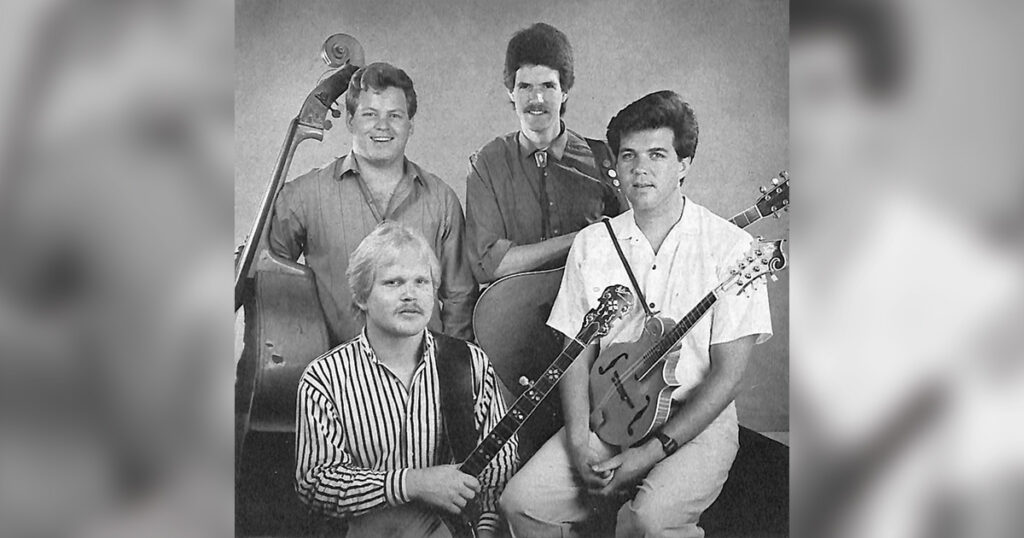
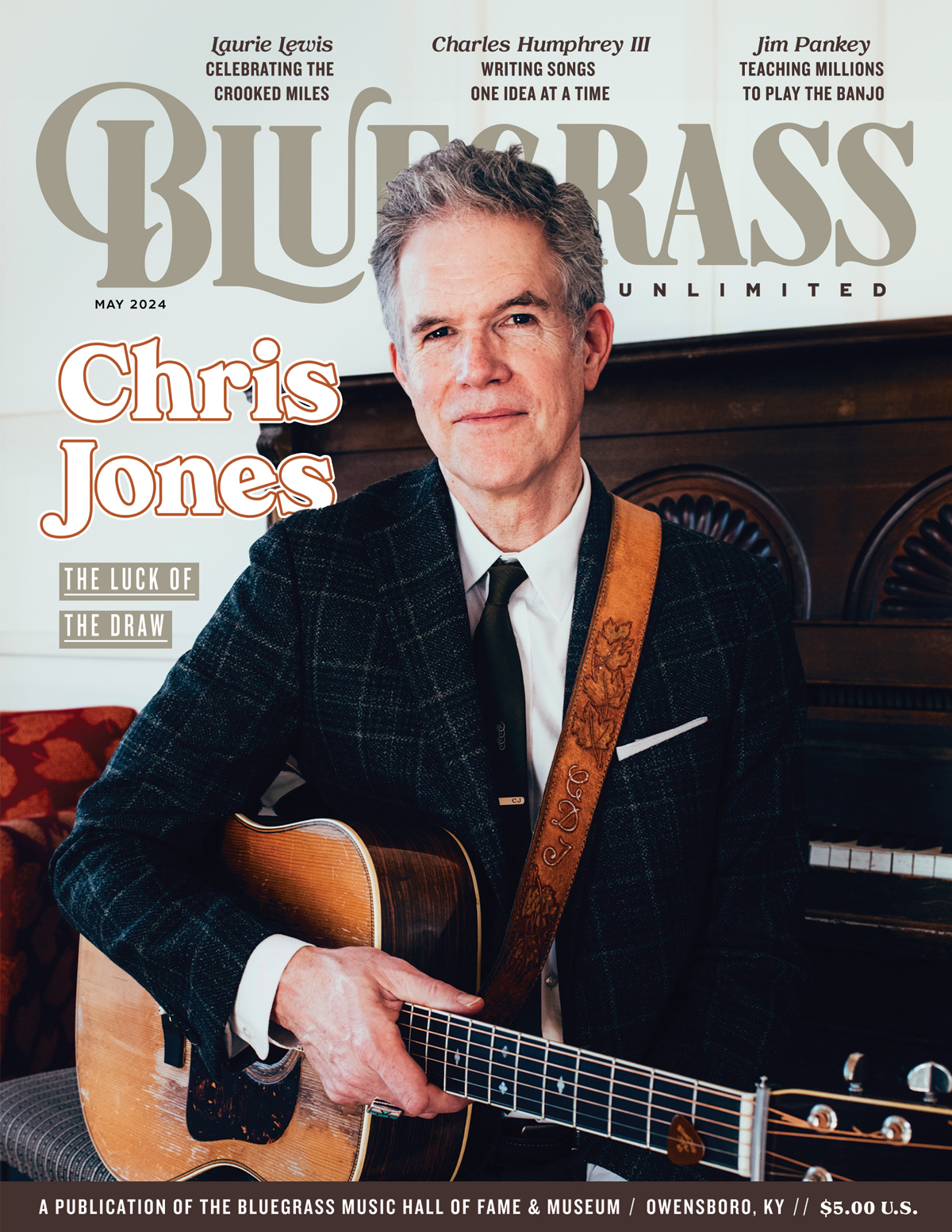
The Weary Hearts band itself may not have lasted, but it’s members attained star status in bluegrass.
I played Weary Hearts Flying Fish label CD on my radio show. I was soon to hear them perform live at one of the first Grand Targhee festivals in Alta, WY. They impressed me so much, I was glad to see how all of its members continued to have such successful careers.
Butch Baldassari and I spoke at the time, and he sent me all of his LPs for my show up in Bozeman, MT. Later, at Owensboro, I was so touched that when he saw me at his booth, he just quickly said, “Hi Rik. How are you doing?” Friendships like that may not only happen in Bluegrass. But they happen a lot more, in my experience!